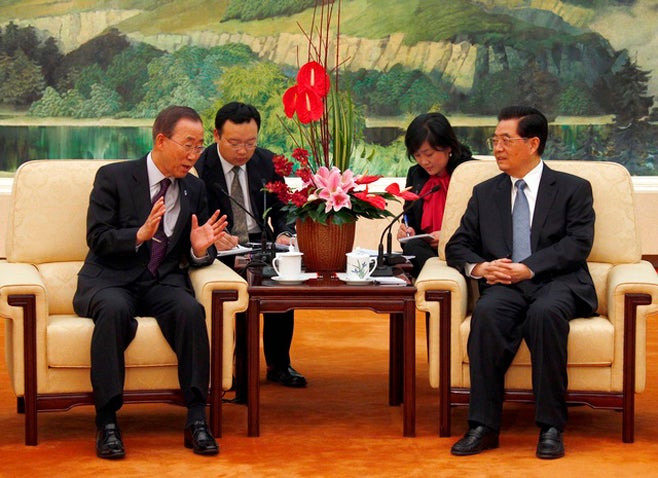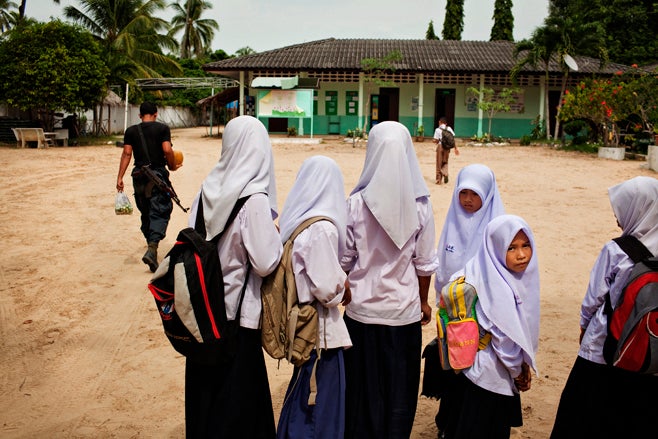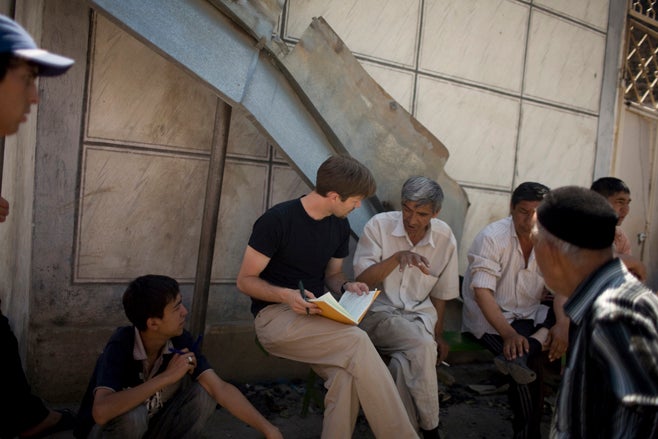Brazil has consolidated its place as one of the most influential democracies in regional and global affairs in recent years, but important human rights challenges remain. Faced with high levels of violent crime, some Brazilian police officers engage in abusive practices instead of pursuing sound policing policies. Detention conditions in the country are often inhumane, and torture remains a serious problem. Forced labor persists in some states despite federal efforts to eradicate it. Indigenous peoples and landless peasants face threats and violence, particularly in rural conflicts over land distribution.
Public Security and Police Conduct
Most of Brazil's metropolitan areas are plagued by widespread violence perpetrated by criminal gangs and abusive police. Violence especially impacts low-income communities. There are more than 40,000 intentional homicides in Brazil every year. In Rio de Janeiro hundreds of low-income communities are occupied and controlled by drug gangs, who routinely engage in violent crime and extortion.
Police abuse, including extrajudicial execution, is a chronic problem. According to official data, police were responsible for 505 killings in the state of Rio de Janeiro alone in the first six months of 2010. This amounts to roughly three police killings per day, or at least one police killing for every six "regular" intentional homicides. The number of killings by police in Sao Paulo, while less than in Rio de Janeiro, is also comparatively high. A 2009 Human Rights Watch report found that police in Sao Paulo state had killed more people over the prior five years than had police in all of South Africa, a country with a higher homicide rate than Sao Paulo.
Police claim these are "resistance" killings that occur in confrontations with criminals. While many police killings undoubtedly result from legitimate use of force by police officers, many others do not, a fact documented by Human Rights Watch and other groups and recognized by Brazilian criminal justice officials. Reform efforts have fallen short because state criminal justice systems rely almost entirely on police investigators to resolve these cases, leaving police largely to police themselves.
In 2010 the attorney general of Sao Paulo took an important step to address the problem of police violence by establishing that all cases involving alleged police abuse be investigated by a special unit of prosecutors.
The state of Rio de Janeiro has installed Pacifying Police Units (UPP) in some favelas (shanty towns) since 2008, with the aim of establishing a more effective police presence at the community level. However, the state has not yet taken adequate steps to ensure that police who commit abuses are held accountable.
Some police officers also commit abuses while off duty. In Rio de Janeiro, police-linked militias control dozens of neighborhoods at gunpoint, extorting residents and committing murders and other violent crimes. The government has undertaken significant efforts to dismantle some of these groups, and dozens of alleged militia members have been arrested, but the problem remains critical.
In April 2010, 23 people were executed in the region of Santos, in the state of Sao Paulo. Local residents have attributed the killings to a death squad known as the "Ninjas" which allegedly includes police officers among its members.
In July 2010, four military police officers were convicted of murdering and decapitating a mentally disabled person. They were identified as being members of a death squad known as the "Highlanders", a nickname derived from the group's practice of cutting off the heads and hands of their victims in an effort to cover up their crimes (a practice from the 1986 fictional film Highlander).
Detention Conditions, Torture, and Ill-Treatment
Brazil's prisons and jails are plagued by inhumane conditions, violence, and severe overcrowding. Delays within the justice system contribute to the overcrowding: some 44 percent of all inmates in the country are pretrial detainees.
Over the past three years the National Council of Justice, the judiciary's oversight body, ordered the release of more than 25,000 prisoners who were being held arbitrarily.
The use of torture is a chronic problem within the penitentiary system. A report by the multiparty National Parliamentary Commission of Inquiry on the Penitentiary System concluded that the national detention system is plagued by "physical and psychological torture." In one case from Goias, the Commission received evidence that the National Security Force subjected female detainees to kicks and electric shocks, stepped on the abdomen of a pregnant woman, and forced another woman to strip naked. A 2010 report by the Pastoral Prison Commission found that these problems continue.
Gangs continue to dominate the prisons in Brazil. In early 2010 gang rivalry in a prison in Parana state led to a riot involving 1,200 prisoners. Five people were killed, including two burned to death.
HIV and tuberculosis prevalence rates in Brazilian prisons are far higher than rates in the general population; overcrowded conditions facilitate the spread of disease and prisoners' access to medical care remains inadequate.
There were also continued reports of substandard conditions at Rio de Janeiro's juvenile detention centers run by the General Department of Socio-Educational Measures (DEGASE). In 2010, 44 DEGASE agents were charged with participating in a torture session in 2008 that resulted in the death of one juvenile and left another 20 injured.
A 2001 law sought to overhaul the system of mental health institutions, which had been plagued by overcrowding and inhumane conditions, but it has not yet been fully implemented.
Reproductive Health Rights
Raids on family planning clinics and aggressive prosecution of abortion limited women's access to reproductive health services in 2010. In May a bill to prioritize the human rights of a fertilized ovum over those of the pregnant woman carrying it was voted favorably out of the Family and Social Security Commission of the Brazilian House of Representatives. The bill is still pending at this writing.
Forced Labor
Since 1995 the federal government has taken important steps to eradicate forced labor, including creating mobile investigation units to monitor conditions in rural areas and establishing a list of employers found to have used forced labor. More than 36,000 workers have been freed since 1995. However, the Pastoral Land Commission reported that more than 6,000 workers were subject to forced labor in 2009. Criminal accountability for offending employers remains relatively rare.
According to the United Nations special rapporteur on contemporary forms of slavery, forced labor is also present in urban centers in the garment industry. Bolivian workers are recruited by Brazilian sweatshops and trafficked to Sao Paulo, where they have to endure harsh living and working conditions. They are often locked in basements, work up to 18 hours a day, and receive very little pay.
Rural Violence and Land Conflicts
Indigenous and landless peoples face threats and violence, particularly in land disputes in rural areas. According to the Pastoral Land Commission, 25 people were killed and 62 were attacked in rural conflicts throughout the country in 2009. In September 2010 José Valmeristo Soares, a member of the Landless Rural Workers' Movement, was killed by gunmen in Para, the state with the highest numbers of such killings.
Confronting Past Abuses
Brazil has never prosecuted those responsible for atrocities committed during the period of its military dictatorship (1964-1985). A 1979 amnesty law has thus far been interpreted to bar prosecutions of state agents, an interpretation reaffirmed in April 2010 by the Supreme Federal Tribunal.
The federal government in 2010 presented a bill creating a national truth commission to investigate dictatorship-era abuses, but at this writing its approval is still pending in congress.
Human Rights Defenders
Some human rights defenders, particularly those working on issues of police violence and land conflicts, suffer intimidation and violence. In January 2009 Manoel Mattos, a human rights lawyer, was shot and killed in the border area between the states of Paraiba and Pernambuco. The main suspect, a police officer linked to a death squad under investigation by Mattos, has been arrested. In October 2010 in an unprecedented decision, the judiciary ruled in favor of a request by the Attorney General's Office to grant federal prosecutors jurisdiction over the case to ensure an independent investigation and prosecution.
Media Freedom
In July 2009 a court issued an injunction prohibiting the newspaper O Estado de Sao Paulo from publishing stories containing information from the "Operacao Faktor" police investigation involving Fernando Sarney, son of Senate President José Sarney. Despite strenuous criticism from national and international press freedom organizations, the ruling was confirmed by the Supreme Federal Tribunal in December 2009. At this writing the restrictions are still in force.
In September 2010 the Supreme Federal Tribunal suspended an electoral law provision that had imposed restrictions on radio and television broadcast of programs that "degrade or ridicule" political candidates.
Key International Actors
In March 2009 the Inter-American Commission on Human Rights filed an application at the Inter-American Court regarding the "Guerrilha do Araguaia" case, asking the court to hold Brazil responsible for the enforced disappearance of guerrilla members carried out by the Brazilian military in the 1970s, during the military dictatorship. It also petitioned the court to instruct the Brazilian government to ensure that the country's amnesty law does not continue to bar the investigation and prosecution of past human rights abuses. In May 2010 the Brazilian defense minister declared that Brazil would not comply with such a ruling. The court's decision is still pending at this writing.
The Inter-American Court of Human Rights issued a ruling against Brazil in September 2009 in the case of Garibaldi v. Brazil, declaring that Brazilian authorities had not acted with due diligence in investigating the death of Sétimo Garibaldi, who was killed in 1998 during an extrajudicial operation aimed at evicting families of landless workers in Parana.
Brazil increased its influence at the UN Human Rights Council. In 2009 the government controversially abstained from supporting strong scrutiny of North Korea, Sri Lanka, and the Democratic Republic of the Congo. In 2010 it improved its record, supporting continued UN monitoring of human rights conditions in North Korea and Sudan and convening a session on Haiti. Brazil also proposed in 2010 that the Council develop a more cooperative, less adversarial approach to its work, an idea that could weaken the Council if not accompanied by new mechanisms to ensure human rights accountability.



